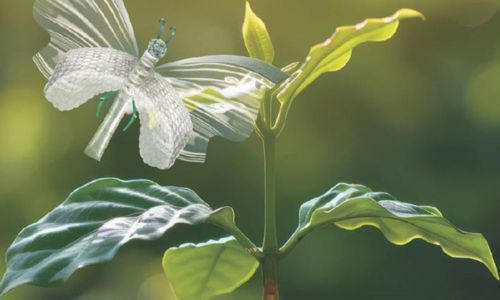Sustainability in Packaging: Innovations & Trends Beyond Recycling
Sustainability in Packaging: Innovations & Trends beyond Recycling
In today’s market, sustainable packaging innovations must go further than simply using recyclable materials. As businesses face increasing regulatory pressure, shifting consumer expectations, and rising waste management costs, the need for broader and more proactive strategies has never been greater.
While recycling remains vital, it’s only one part of the solution. This blog explores the packaging sustainability trends reshaping the industry and highlights how FROMM Packaging Australia is helping businesses achieve real-world impact through smart, scalable, and eco-conscious packaging solutions.
As a member of the Australian Packaging Covenant Organisation (APCO), FROMM is committed to supporting Australia’s 2025 National Packaging Targets through product innovation and supply chain collaboration.

Why recycling alone isn't enough
Recycling is a critical component of sustainability—but it has its limitations. Many recyclable materials end up in landfill due to contamination, downcycling (where materials degrade in quality), or gaps in infrastructure. In some cases, the environmental cost of transporting and processing materials can even outweigh the benefits.
This is where the “4 Rs” come into play: Reduce, Reuse, Rethink, Redesign. These principles push beyond recycling and focus on designing systems and solutions that prevent waste in the first place, maximise resource efficiency, and deliver longer-term value to both businesses and the environment.
Real world innovations from FROMM
At FROMM, sustainability isn’t a buzzword—it’s built into the company’s products, processes, and partnerships. Below are several practical innovations already making a difference for FROMM customers.
This eco-friendly alternative to traditional void fill uses 99% air to protect goods, drastically reducing material use. It’s made with 75% recycled paper and can be recycled in curbside programs, making it both efficient and responsible.
FROMM’s on-demand void fill solution produces 100% recyclable paper that replaces plastic-based materials and reduces overall packaging volume. Businesses benefit from lower material costs and easier disposal for end-users.
FROMM’s Post-Consumer Recycled (PCR) PET strapping contains up to 98% recycled content from recovered beverage bottles. This supports a circular economy by turning waste into a valuable, high performance product used in secure palletising and bundling.
Emerging sustainability trends in packaging
Sustainability today goes beyond packaging materials. It’s about the systems and behaviours that surround them. These emerging trends highlight how businesses are driving impact through holistic change.
Circular Economy Business Models
More companies are adopting systems such as refillable packaging, closed-loop solutions, and material take-back programs. FROMM supports this approach with solutions like its PET strapping recovery initiative. Learn more in the blog: Turn Your Plastic Strap Waste Into A Recyclable Asset.
Reducing the Use of Materials
FROMM uses its transport simulation technology to help customers test packaging configurations and avoid overwrapping or overstrapping. By accurately matching film or strap to product requirements, businesses can confidently reduce plastic use without compromising load stability.
Upgrading to Efficient Machinery
Common pitfalls and greenwashing traps
Questions to ask your supplier - Not all “green” claims are equal. Ask your supplier if their packaging solutions are verified by recognised standards, whether they support circular recovery, and how they perform under real world conditions.
Biodegradable vs. Recyclable - Biodegradable plastics can break down into microplastics—polluting soil and waterways. Recyclable materials, when properly processed, re-enter the production cycle and create lasting value. Prioritise recyclable over biodegradable options wherever possible.
What is the product made from? - When sourcing packaging materials, especially with sustainability in mind, it's essential to ask your supplier what the strap or wrap is made from and whether they can provide certified documentation. Understanding if the product is made from 100% virgin material or includes recycled content helps verify its environmental impact. Be sure to confirm if any recycled content is post-consumer recycled (PCR), as this is internationally recognised as genuine recycled material. Avoid relying on materials that include post-industrial recycled (PIR) content, which can be misleading and may contribute to greenwashing. Transparency is key—your supplier should be open and honest about the material composition, aligning with industry standards and your sustainability goals. To learn more about sustainability at FROMM, refer to: FROMM Sustainability.
Review entire supply chain - Sustainability isn’t just about what you ship—it’s about how it’s made, transported, and recovered. Work with partners like FROMM that take a whole-of-supply-chain approach to reduce environmental impact.
Measure waste & cost - Use data to evaluate packaging waste and inefficiencies. FROMM’s wrapping systems can help track material usage and our expert team can help you pinpoint opportunities for waste reduction and cost savings.
Have more questions? Speak with a FROMM expert or call 1800 940 356.
Ready to future-proof your packaging? Contact us online or call 1800 940 356 to explore FROMM’s sustainable packaging innovations.
Sustainability FAQs
Many businesses can use thinner stretch films than they currently are and can discover this through application testing using technology like FROMM’s transport simulator. If budget allows, upgrade to precision machinery, to ensure consistent product application every time. These strategies ensure product protection while cutting excess material.









